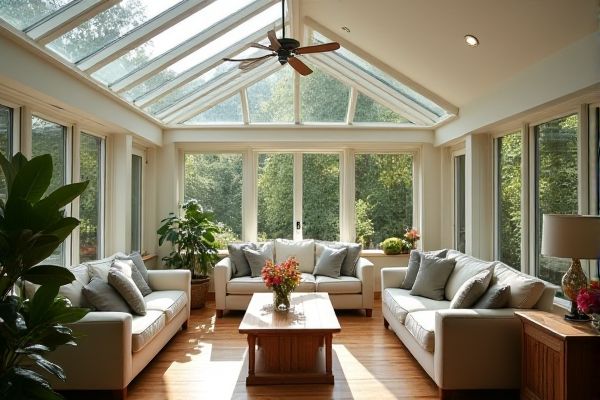
Uplights and downlights create distinct ambiances in sunrooms; uplights cast a soft glow upward to highlight architectural features and add warmth, while downlights provide focused illumination ideal for tasks and enhancing brightness. Explore the rest of the article to find which lighting style best complements your sunroom's design and functionality.
Table of Comparison
| Feature | Uplight Sunroom | Downlight Sunroom |
|---|---|---|
| Lighting Direction | Illuminates walls and ceiling upward | Lights area below, focused downward |
| Ambiance | Creates soft, diffused glow enhancing room height | Provides direct, focused light for tasks |
| Energy Efficiency | Often uses LED bulbs with low energy consumption | LED downlights offer targeted, efficient lighting |
| Installation Height | Typically installed at base of walls or floor level | Installed on ceiling or overhead structures |
| Best Use | Enhances wall textures, creates spacious feel | Ideal for task lighting, reading, and focused areas |
| Sunroom Lighting Impact | Enhances natural light, adds ambient warmth | Supplements natural light with precise brightness |
Introduction to Sunroom Lighting
Sunroom lighting plays a crucial role in enhancing the ambiance and functionality of your space, with uplight and downlight options offering distinct benefits. Uplights create a soft, indirect glow that highlights architectural features and adds warmth, while downlights provide focused illumination ideal for task lighting and evening use. Choosing the right balance of uplight vs downlight in your sunroom ensures optimal brightness and mood tailored to your lifestyle.
What Are Uplights?
Uplights in a sunroom are lighting fixtures installed near the floor or lower walls, designed to project light upward, creating ambient and accent lighting that enhances architectural features or plants. These lights add depth and warmth by illuminating walls and ceilings, making the space feel larger and more inviting. Compared to downlights, which focus light downward for task or general lighting, uplights emphasize atmosphere and highlight textures within the sunroom.
What Are Downlights?
Downlights are recessed lighting fixtures installed into the ceiling, providing focused, downward illumination that enhances ambiance and visibility in sunrooms. These fixtures are celebrated for their sleek design, minimizing visual clutter while delivering efficient, directed light ideal for task or accent lighting. Energy-efficient LED downlights contribute to a sunroom's aesthetic by highlighting architectural features without overwhelming natural daylight.
Aesthetic Differences: Uplight vs Downlight
Uplight sunroom lighting enhances architectural features by casting light upward, creating a soft, ambient glow that accentuates ceiling textures and provides a warm, inviting atmosphere. In contrast, downlight fixtures offer focused illumination directed downward, emphasizing furniture and floor areas with sharper, task-oriented light. The choice between uplight and downlight significantly affects the room's mood and spatial perception, with uplights promoting openness and downlights enhancing functionality.
Functionality and Practical Use in Sunrooms
Uplight sunroom lighting enhances ambient illumination by reflecting light off ceilings, creating a soft, diffused glow ideal for evening relaxation and enhancing the perception of space. Downlight fixtures provide focused, direct light that improves task visibility, making them practical for activities such as reading or gardening within your sunroom. Balancing both uplight and downlight options can optimize functionality, offering versatile lighting suited to varied sunroom uses throughout the day.
Energy Efficiency: Uplight vs Downlight
Uplight sunrooms typically enhance natural light distribution by reflecting sunlight upwards, reducing the need for artificial lighting and improving energy efficiency during daytime hours. Downlight sunrooms concentrate illumination downward, which can increase reliance on electric lighting, especially in shaded or compact areas, potentially raising energy consumption. Choosing uplight configurations optimizes passive solar gain and lowers electricity usage compared to downlight options.
Ambiance and Mood Creation
Uplight sunrooms create a warm, inviting ambiance by casting light upward, enhancing ceiling textures and producing a soft, diffused glow that elevates mood and relaxation. Downlight sunrooms emphasize focused illumination on specific areas, ideal for task-oriented activities, creating a bright, energizing atmosphere. Choosing between uplight and downlight depends on the desired mood, with uplight favoring cozy, ambient settings and downlight supporting clarity and concentration.
Installation Considerations
Uplight sunrooms require careful placement of lighting fixtures to ensure even illumination without glare, often necessitating ceiling-mounted or recessed lights to enhance natural light reflection. Downlight sunrooms involve installing fixtures in the ceiling that direct light downward, demanding precise spacing to avoid shadows and hotspots, especially in larger sunroom areas. Your choice should factor in ceiling height, wiring accessibility, and integration with existing electrical systems for a seamless installation process.
Maintenance and Longevity
Uplight sunrooms typically require less frequent cleaning as dust and debris settle less on upward-facing surfaces, extending their aesthetic appeal. Downlight sunrooms may demand more regular maintenance to remove dirt and water spots from downward-facing glass or fixtures, which can impact longevity if neglected. Your choice should consider the ease of access for cleaning to ensure optimal durability and performance over time.
Choosing the Best Lighting for Your Sunroom
Uplight and downlight options both enhance your sunroom's ambiance, but your choice depends on desired mood and functionality. Uplighting creates a soft, indirect glow that highlights architectural features and adds warmth, while downlighting provides focused illumination ideal for tasks and reading. Consider your sunroom's purpose and furniture placement to select lighting that complements the space and enhances your comfort.
 homyna.com
homyna.com